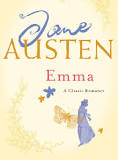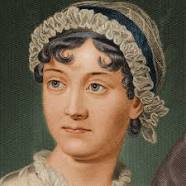Emma Page #12
Emma, by Jane Austen, is a novel about youthful hubris and the perils of misconstrued romance. The story takes place in the fictional village of Highbury and the surrounding estates of Hartfield, Randalls, and Donwell Abbey and involves the relationships among individuals in those locations consisting of "3 or 4 families in a country village". The novel was first published in December 1815 while the author was alive, with its title page listing a publication date of 1816. As in her other novels, Austen explores the concerns and difficulties of genteel women living in Georgian–Regency England; she also creates a lively comedy of manners among her characters and depicts issues of marriage, gender, age, and social status.
She had soon fixed on the size and sort of portrait. It was to be a whole-length in water-colours, like Mr. John Knightley's, and was destined, if she could please herself, to hold a very honourable station over the mantelpiece. The sitting began; and Harriet, smiling and blushing, and afraid of not keeping her attitude and countenance, presented a very sweet mixture of youthful expression to the steady eyes of the artist. But there was no doing any thing, with Mr. Elton fidgeting behind her and watching every touch. She gave him credit for stationing himself where he might gaze and gaze again without offence; but was really obliged to put an end to it, and request him to place himself elsewhere. It then occurred to her to employ him in reading. “If he would be so good as to read to them, it would be a kindness indeed! It would amuse away the difficulties of her part, and lessen the irksomeness of Miss Smith's.” Mr. Elton was only too happy. Harriet listened, and Emma drew in peace. She must allow him to be still frequently coming to look; any thing less would certainly have been too little in a lover; and he was ready at the smallest intermission of the pencil, to jump up and see the progress, and be charmed.--There was no being displeased with such an encourager, for his admiration made him discern a likeness almost before it was possible. She could not respect his eye, but his love and his complaisance were unexceptionable. The sitting was altogether very satisfactory; she was quite enough pleased with the first day's sketch to wish to go on. There was no want of likeness, she had been fortunate in the attitude, and as she meant to throw in a little improvement to the figure, to give a little more height, and considerably more elegance, she had great confidence of its being in every way a pretty drawing at last, and of its filling its destined place with credit to them both--a standing memorial of the beauty of one, the skill of the other, and the friendship of both; with as many other agreeable associations as Mr. Elton's very promising attachment was likely to add. Harriet was to sit again the next day; and Mr. Elton, just as he ought, entreated for the permission of attending and reading to them again. “By all means. We shall be most happy to consider you as one of the party.” The same civilities and courtesies, the same success and satisfaction, took place on the morrow, and accompanied the whole progress of the picture, which was rapid and happy. Every body who saw it was pleased, but Mr. Elton was in continual raptures, and defended it through every criticism. “Miss Woodhouse has given her friend the only beauty she wanted,”--observed Mrs. Weston to him--not in the least suspecting that she was addressing a lover.--“The expression of the eye is most correct, but Miss Smith has not those eyebrows and eyelashes. It is the fault of her face that she has them not.” “Do you think so?” replied he. “I cannot agree with you. It appears to me a most perfect resemblance in every feature. I never saw such a likeness in my life. We must allow for the effect of shade, you know.” “You have made her too tall, Emma,” said Mr. Knightley. Emma knew that she had, but would not own it; and Mr. Elton warmly added, “Oh no! certainly not too tall; not in the least too tall. Consider, she is sitting down--which naturally presents a different--which in short gives exactly the idea--and the proportions must be preserved, you know. Proportions, fore-shortening.--Oh no! it gives one exactly the idea of such a height as Miss Smith's. Exactly so indeed!” “It is very pretty,” said Mr. Woodhouse. “So prettily done! Just as your drawings always are, my dear. I do not know any body who draws so well as you do. The only thing I do not thoroughly like is, that she seems to be sitting out of doors, with only a little shawl over her shoulders--and it makes one think she must catch cold.” “But, my dear papa, it is supposed to be summer; a warm day in summer. Look at the tree.” “But it is never safe to sit out of doors, my dear.” “You, sir, may say any thing,” cried Mr. Elton, “but I must confess that I regard it as a most happy thought, the placing of Miss Smith out of doors; and the tree is touched with such inimitable spirit! Any other situation would have been much less in character. The naivete of Miss Smith's manners--and altogether--Oh, it is most admirable! I cannot keep my eyes from it. I never saw such a likeness.” The next thing wanted was to get the picture framed; and here were a few difficulties. It must be done directly; it must be done in London; the order must go through the hands of some intelligent person whose taste could be depended on; and Isabella, the usual doer of all commissions, must not be applied to, because it was December, and Mr. Woodhouse could not bear the idea of her stirring out of her house in the fogs of December. But no sooner was the distress known to Mr. Elton, than it was removed. His gallantry was always on the alert. “Might he be trusted with the commission, what infinite pleasure should he have in executing it! he could ride to London at any time. It was impossible to say how much he should be gratified by being employed on such an errand.” “He was too good!--she could not endure the thought!--she would not give him such a troublesome office for the world,”--brought on the desired repetition of entreaties and assurances,--and a very few minutes settled the business. Mr. Elton was to take the drawing to London, chuse the frame, and give the directions; and Emma thought she could so pack it as to ensure its safety without much incommoding him, while he seemed mostly fearful of not being incommoded enough. “What a precious deposit!” said he with a tender sigh, as he received it. “This man is almost too gallant to be in love,” thought Emma. “I should say so, but that I suppose there may be a hundred different ways of being in love. He is an excellent young man, and will suit Harriet exactly; it will be an 'Exactly so,' as he says himself; but he does sigh and languish, and study for compliments rather more than I could endure as a principal. I come in for a pretty good share as a second. But it is his gratitude on Harriet's account.” CHAPTER VII The very day of Mr. Elton's going to London produced a fresh occasion for Emma's services towards her friend. Harriet had been at Hartfield, as usual, soon after breakfast; and, after a time, had gone home to return again to dinner: she returned, and sooner than had been talked of, and with an agitated, hurried look, announcing something extraordinary to have happened which she was longing to tell. Half a minute brought it all out. She had heard, as soon as she got back to Mrs. Goddard's, that Mr. Martin had been there an hour before, and finding she was not at home, nor particularly expected, had left a little parcel for her from one of his sisters, and gone away; and on opening this parcel, she had actually found, besides the two songs which she had lent Elizabeth to copy, a letter to herself; and this letter was from him, from Mr. Martin, and contained a direct proposal of marriage. “Who could have thought it? She was so surprized she did not know what to do. Yes, quite a proposal of marriage; and a very good letter, at least she thought so. And he wrote as if he really loved her very much--but she did not know--and so, she was come as fast as she could to ask Miss Woodhouse what she should do.--” Emma was half-ashamed of her friend for seeming so pleased and so doubtful.
Translation
Translate and read this book in other languages:
Select another language:
- - Select -
- 简体中文 (Chinese - Simplified)
- 繁體中文 (Chinese - Traditional)
- Español (Spanish)
- Esperanto (Esperanto)
- 日本語 (Japanese)
- Português (Portuguese)
- Deutsch (German)
- العربية (Arabic)
- Français (French)
- Русский (Russian)
- ಕನ್ನಡ (Kannada)
- 한국어 (Korean)
- עברית (Hebrew)
- Gaeilge (Irish)
- Українська (Ukrainian)
- اردو (Urdu)
- Magyar (Hungarian)
- मानक हिन्दी (Hindi)
- Indonesia (Indonesian)
- Italiano (Italian)
- தமிழ் (Tamil)
- Türkçe (Turkish)
- తెలుగు (Telugu)
- ภาษาไทย (Thai)
- Tiếng Việt (Vietnamese)
- Čeština (Czech)
- Polski (Polish)
- Bahasa Indonesia (Indonesian)
- Românește (Romanian)
- Nederlands (Dutch)
- Ελληνικά (Greek)
- Latinum (Latin)
- Svenska (Swedish)
- Dansk (Danish)
- Suomi (Finnish)
- فارسی (Persian)
- ייִדיש (Yiddish)
- հայերեն (Armenian)
- Norsk (Norwegian)
- English (English)
Citation
Use the citation below to add this book to your bibliography:
Style:MLAChicagoAPA
"Emma Books." Literature.com. STANDS4 LLC, 2024. Web. 24 Dec. 2024. <https://www.literature.com/book/emma_29>.




Discuss this Emma book with the community:
Report Comment
We're doing our best to make sure our content is useful, accurate and safe.
If by any chance you spot an inappropriate comment while navigating through our website please use this form to let us know, and we'll take care of it shortly.
Attachment
You need to be logged in to favorite.
Log In